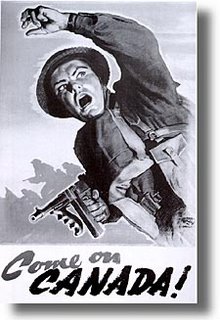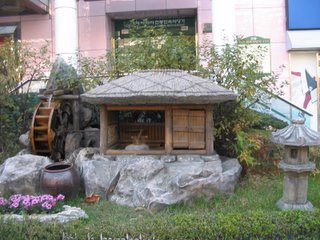
Canada has had a long history of conflict, within the country and abroad, beginning with the conflict between the native peoples and European settlers (starting with the Vikings c.1000, continuing with the conflict between French settlers and the Iroquois, up until the appalling treatment by westward advancing settlers and the government of Canada) to current peace-keeping missions conducted by an under-funded and under-appreciated shell of an army.
The first conflict between native peoples and European settlers began with the Viking explorers in eastern Canada c.1000. French settlers fought with the Iroquois until a treaty was signed in 1701. Relations with the native peoples and new Canadians have run hot and cold. Nevertheless, the native peoples supported the new Canadians, most notably in the Seven Years' War (1756-1763), the War of 1812 (1812-1814) and both World War I and World War II, which saw the outstanding but barely remembered bravery of Tommy Prince (it should also be noted that, despite treaties exempting native peoples from fighting, the number of volunteers was greater than the rest of the Canadian population).
One of the most formidable battles between the British and French in Upper and Lower Canada (what are now the provinces of Ontario and Quebec) was on the Plains of Abraham in 1759 where Generals Wolfe and Montcalm were mortally wounded. The British gained the upperhand and appropriated the French colonies.
Canada's struggle with the Americans did not begin with the War of 1812 but rather, during 1763-1776, when the Americans, intent on overthrowing the British, tried to overtake Quebec. Though the Americans captured Montreal, they were repulsed at Quebec City and finally withdrew in 1776. Loyalists from the American Revolutionary War spilled into Canada and eventually settled there. There were a series of disputes prior to the War of 1812, a two year war which saw the Americans repulsed once more.
Some 40,000 to 60,000 Canadians participated in the American Civil War, some voluntarily joining the conflict and some deceived.
Canadians, as subjects to the Crown, were pressed into service during the Boer War (1899-1902) and the First World War (1914-1918). Canadians proudly went to war for a distant monarch unaware that the face of warfare had changed. No longer a gentleman's game, Canadians (fodder, like the Australians and British were) were crippled by mustard gas and machine gun fire. The capture (victory) of Vimy Ridge seems pyrrhic given the casualities- 3,598 killed and 7,000 wounded. Nevertheless, Canada earned a reputation as a fighting force worth noting.
It wasn't until September 10, 1939, that Canada did what it had not done before- declared war on its own. Canada sent 1.5 million personnel overseas. Canadians saw disastrous action in Hong Kong (which fell to the Japanese in December 1941) and the infamous raid on Dieppe (Molotov threatened to make peace with the Nazis if a second front wasn't opened and the result was the mess in Dieppe, which saw 807 men die on the first day; more would die in captivity). But Canadian forces bounced back with victories in Italy, northwest Europe and on D-Day, making the furthest inroads in a single day. Canadians also participated as pilots and communications specialists in the struggle against Japan.
The Korean War (1950-53)- Canada's forgotten war- saw the deaths of 516 men who died defending ground that would end up in the hands of the North Koreans. The Canadian navy supported the assault on Incheon (not far from where I live) and the Canadian Regiment launched an attack on the village of Chail-li. The war eventually became uglier, especially with the Chinese supporting the North Koreans. Patrols and securing prisoners became the lot toward the end of the war in 1953.
Contrary to popular belief, Canada
did play a part in the Vietnam War, though the role was largely noncombative. Relief was sent to South Vietnam and Canadian negotiators assisted the Americans. There were, however, Canadian volunteers in the conflict, an estimated 10,000 volunteers. After the war, these volunteers recieved little help or support, either from the government or their compatriots.
The military today is largely under-funded and forgotten, despite the bravery and formidable service of Canadian sharpshooters in Afghanistan. It is also subject to the whims of politicians who treat conflict like gentlemens' games, which explains the under-funding of the army and the shocking lack of support for defensive measures, such as was seen in Rwanda when the failure to provide logistical support to then General Romeo Dallaire cost a number of Tutsi lives (Dallaire is portrayed, rather loosely, by Nick Nolte in the superb film,
Hotel Rwanda).
This post is, by no means, meant to glorify war but to note how war shaped Canada and how Canadians should not forget that they were there, too.
(Huge thanks to the following informative websites and essays:
The Canadian War Museum,
The Korean War,
"Aboriginal Participation in Canadian Military Service: Historic and Contemporary Contexts" by John Moses,
Canadians in the American Civil War and wikipedia.com)





